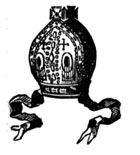
St. Vincent Pallotti & the Oxford Movement
EDITORIAL
This year commemorates the bicentennial of the birth of St. Vincent Pallotti, under whose patronage the New Oxford Review is published. As a priest in Rome, his thirst for holiness led him to seek to renew efforts to evangelize the entire world, which efforts were to be rooted in a dynamic revival of faith among Catholics.
Fr. Pallotti enthusiastically recruited members for his new society, called the Union of the Catholic Apostolate, from every walk of life. The poor and penniless held equal membership with wealthy donors, for the poor contributed their prayers. The sick, handicapped, and incapacitated offered up their pain and suffering so that the project would be blessed with success. Everyone’s talents and contributions united in a harmonious offering for the growth of God’s Kingdom.
Fr. Pallotti never left Italy, but he was well informed of the workings of the Church in mission lands. He was spiritual advisor for many of the Roman seminaries, whose students had come to Rome for their priestly studies. He met regularly with them and their priests and teachers, and among his charges were the seminarians from England. The English College, on Via Monserrato, was not far from his rectory at Holy Spirit Church. This venerable institution had trained clergy who were destined to return to their hostile motherland and a clandestine ministry that had often ended with the hangman’s noose or butcher’s axe. In more peaceful times it continued its mission to provide priests for England. Into this Alma Mater of so many saints, blesseds, and venerables who shed their blood for the reconciliation of their country to its ancient Catholic heritage and unity with the See of Peter came the humble and saintly Fr. Pallotti. Dr. Nicholas Wiseman was its Rector and made Pallotti most welcome. He gave Pallotti the responsibility of conducting the ordination retreats.
In an atmosphere where the conversion of England was a deeply desired goal and the object of much prayer, news of the Oxford Movement in England (for which the NEW OXFORD REVIEW is named) was followed avidly and discussed with great excitement. Wiseman, the faculty, and students kept Pallotti well informed.
You May Also Enjoy
For many a Protestant who would never have been able to make the jump to Rome immediately, Anglo-Catholicism has served as a halfway house.
Now in our time an edition of the BCP has appeared under the auspices of the Roman Catholic Church, which does what none of its predecessors did or could do.
Some say the demise of Anglicanism truly began in the 1530s when King Henry VIII "nationalized" the Catholic Church in England.

